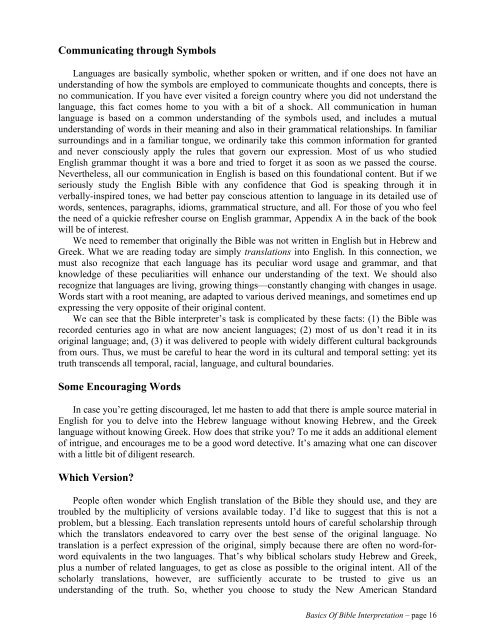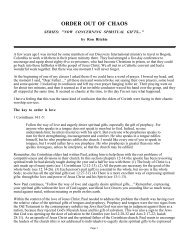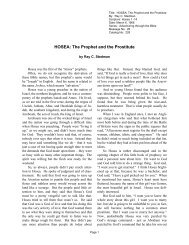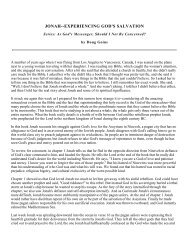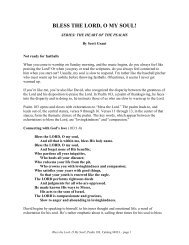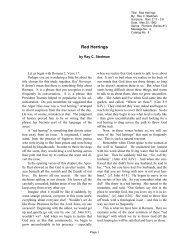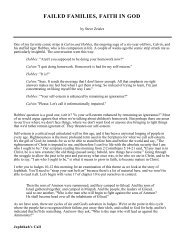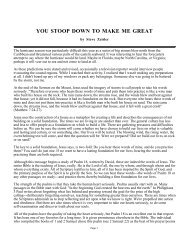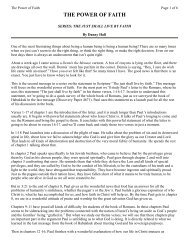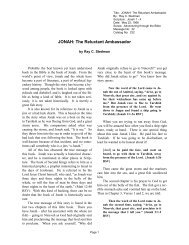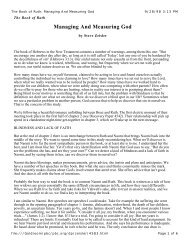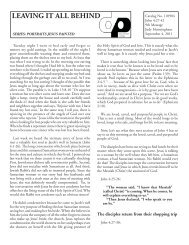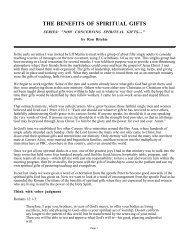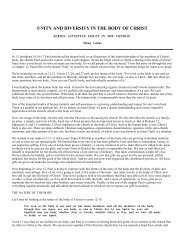Basics of Bible Interpretation - RayStedman.org
Basics of Bible Interpretation - RayStedman.org
Basics of Bible Interpretation - RayStedman.org
Create successful ePaper yourself
Turn your PDF publications into a flip-book with our unique Google optimized e-Paper software.
Communicating through Symbols<br />
Languages are basically symbolic, whether spoken or written, and if one does not have an<br />
understanding <strong>of</strong> how the symbols are employed to communicate thoughts and concepts, there is<br />
no communication. If you have ever visited a foreign country where you did not understand the<br />
language, this fact comes home to you with a bit <strong>of</strong> a shock. All communication in human<br />
language is based on a common understanding <strong>of</strong> the symbols used, and includes a mutual<br />
understanding <strong>of</strong> words in their meaning and also in their grammatical relationships. In familiar<br />
surroundings and in a familiar tongue, we ordinarily take this common information for granted<br />
and never consciously apply the rules that govern our expression. Most <strong>of</strong> us who studied<br />
English grammar thought it was a bore and tried to f<strong>org</strong>et it as soon as we passed the course.<br />
Nevertheless, all our communication in English is based on this foundational content. But if we<br />
seriously study the English <strong>Bible</strong> with any confidence that God is speaking through it in<br />
verbally-inspired tones, we had better pay conscious attention to language in its detailed use <strong>of</strong><br />
words, sentences, paragraphs, idioms, grammatical structure, and all. For those <strong>of</strong> you who feel<br />
the need <strong>of</strong> a quickie refresher course on English grammar, Appendix A in the back <strong>of</strong> the book<br />
will be <strong>of</strong> interest.<br />
We need to remember that originally the <strong>Bible</strong> was not written in English but in Hebrew and<br />
Greek. What we are reading today are simply translations into English. In this connection, we<br />
must also recognize that each language has its peculiar word usage and grammar, and that<br />
knowledge <strong>of</strong> these peculiarities will enhance our understanding <strong>of</strong> the text. We should also<br />
recognize that languages are living, growing things—constantly changing with changes in usage.<br />
Words start with a root meaning, are adapted to various derived meanings, and sometimes end up<br />
expressing the very opposite <strong>of</strong> their original content.<br />
We can see that the <strong>Bible</strong> interpreter’s task is complicated by these facts: (1) the <strong>Bible</strong> was<br />
recorded centuries ago in what are now ancient languages; (2) most <strong>of</strong> us don’t read it in its<br />
original language; and, (3) it was delivered to people with widely different cultural backgrounds<br />
from ours. Thus, we must be careful to hear the word in its cultural and temporal setting: yet its<br />
truth transcends all temporal, racial, language, and cultural boundaries.<br />
Some Encouraging Words<br />
In case you’re getting discouraged, let me hasten to add that there is ample source material in<br />
English for you to delve into the Hebrew language without knowing Hebrew, and the Greek<br />
language without knowing Greek. How does that strike you? To me it adds an additional element<br />
<strong>of</strong> intrigue, and encourages me to be a good word detective. It’s amazing what one can discover<br />
with a little bit <strong>of</strong> diligent research.<br />
Which Version?<br />
People <strong>of</strong>ten wonder which English translation <strong>of</strong> the <strong>Bible</strong> they should use, and they are<br />
troubled by the multiplicity <strong>of</strong> versions available today. I’d like to suggest that this is not a<br />
problem, but a blessing. Each translation represents untold hours <strong>of</strong> careful scholarship through<br />
which the translators endeavored to carry over the best sense <strong>of</strong> the original language. No<br />
translation is a perfect expression <strong>of</strong> the original, simply because there are <strong>of</strong>ten no word-forword<br />
equivalents in the two languages. That’s why biblical scholars study Hebrew and Greek,<br />
plus a number <strong>of</strong> related languages, to get as close as possible to the original intent. All <strong>of</strong> the<br />
scholarly translations, however, are sufficiently accurate to be trusted to give us an<br />
understanding <strong>of</strong> the truth. So, whether you choose to study the New American Standard<br />
<strong>Basics</strong> Of <strong>Bible</strong> <strong>Interpretation</strong> – page 16


